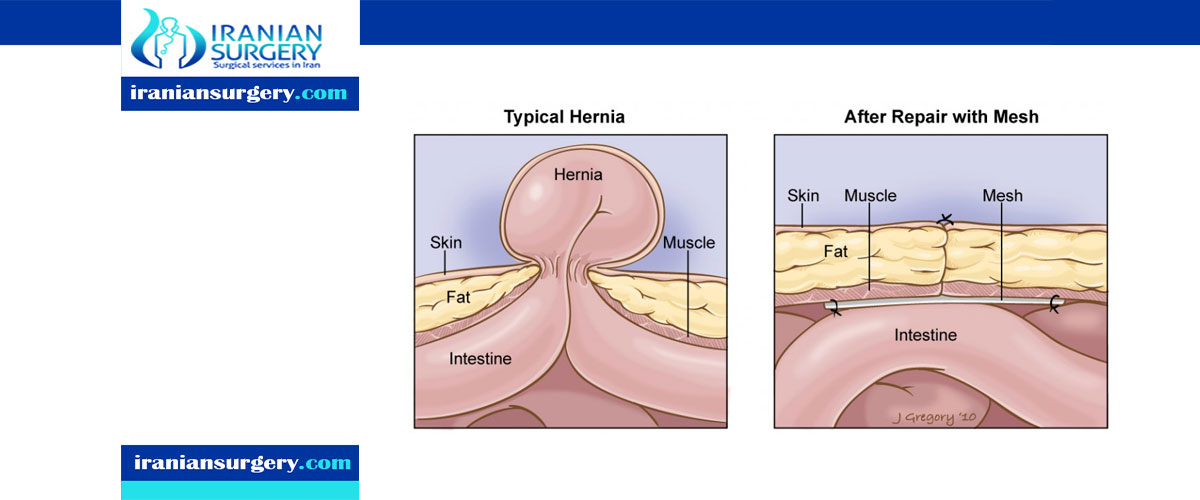Repairing an umbilical hernia
An umbilical hernia repair is a relatively simple procedure that normally takes about 20 to 30 minutes. General anaesthetic is usually used so there's no pain while the operation is carried out.
In children, the weak spot in the abdominal wall is usually closed with stitches. If the hernia is large or in adults, a special mesh may be used to strengthen the area instead.
You or your child should be able to go home on the same day as the operation. You may feel a bit sore and uncomfortable while you recover.
You'll need to limit strenuous activities for a few weeks after the operation, and 1 or 2 weeks off school or work is often recommended. Most people are able to return to all their normal activities within a month of surgery.
10 common questions about Repairing an umbilical hernia
1Do umbilical hernias need to be repaired?
Women who have had multiple pregnancies are at even greater risk for umbilical hernias. Umbilical hernias in adults are less likely to go away on their own. They usually grow larger over time and often require surgical repair
2How long does it take to recover from umbilical hernia surgery?
After recovery, you can usually return to work within 2 to 3 days. You will not be able to lift anything over 10 pounds, climb, or do strenuous activity for 4 to 6 weeks following surgical repair of an umbilical hernia
3Can you fix an umbilical hernia without surgery?
Without surgery, the hernia will not heal, and the pain and size of the hernia usually increases over time. Hernia repair surgery may be performed either as conventional open surgery or as a less invasive laparoscopic procedure
4How serious is an umbilical hernia?
An umbilical hernia is not dangerous in itself, but there is a risk that it will get trapped (incarcerated). This can cut off the blood supply to the contents of the hernia, causing life-threatening conditions such as gangrene or peritonitis (if this happens, the hernia is said to be strangulated)
5What happens if a hernia is left untreated?
If left untreated, your hernia may grow and become more painful. A portion of your intestine could become trapped in the abdominal wall. This can obstruct your bowel and cause severe pain, nausea, or constipation. ... A strangulated hernia is life-threatening and requires immediate medical care.
6Can I push my umbilical hernia back in?
If the hernia is small and painless and you can push it back into your belly, you may be able to wait. Babies and young children are more likely to have tissue get trapped in a hernia
7Do you lose weight after umbilical hernia surgery?
Weight loss alone may decrease your pain and reduce the size of the bulge from your hernia to the point where surgery will no longer be needed, or may be delayed for many years. We recommend reaching a BMI of less than 35 prior to hernia repair
8How do I know if my umbilical hernia is strangulated?
Alongside a bulge, symptoms of a strangulated hernia may include fever, fatigue, nausea, and excruciating pain. One common indication of a strangulated hernia is an easily visible bulge in the areas of the abdomen or pelvis. ... nausea. vomiting
9Which surgery is best for umbilical hernia?
Open surgery is safe and effective and has been done for many years. Laparoscopic hernia repair. A surgeon inserts a thin, lighted scope through a small incision in the belly. Surgical tools to repair the hernia are inserted through other small incisions in the belly
10Will losing weight help with umbilical hernia?
Cutting back on sugar, exercising and losing weight will put less pressure upon an umbilical hernia and may decrease the likelihood of ever needing hernia surgery. ... In adults, umbilical hernias develop because of increased pressure within the abdomen that stretches and weakens the tissue (fascia) at the umbilicus
[kkstarratings]



